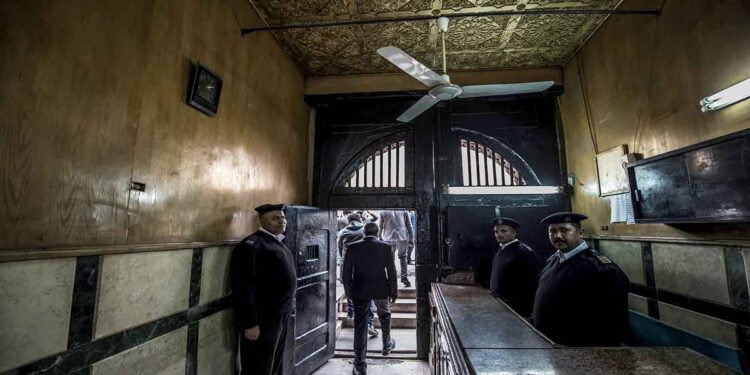A message shared by human rights activists has revealed that prisoners-of-conscience in Egypt’s notorious ‘Scorpion’ prison, south of Cairo, have resorted to hunger striking, and even setting their own cells on fire, in protest against continuous abuse from prison authorities.
Detainees in the prison have said in a leaked message, “we began our hunger strike two weeks ago, hoping that officials would hear our calls to be removed from isolation cells, to be able to see our families, and for our natural rights. They did not respond. No one listened to us. Their message is always: ‘Kill yourselves, we don’t care about [hunger] strikes.’”
And, the message continued, “We were so constrained that we set fire to our cells on the Friday before last, 13 August 2021. Twelve of us suffered injuries from the fire. We did this so that authorities would notice us.”
“However, the prison administration reacted with brutality – abuse, stripping, humiliations, beatings, isolation. A whole wing was turned into the HQ for civil defense forces and riot police, who threatened us with everything, including the arrest of our families. The wasteland [as the letter refers to the prison] went quiet after that.
The letter ended with the line, “free people of the world, save us; and to the [prison] officials, if you fear responsibility before God, protect us.”
Human rights groups have said that the number of prisoners on hunger strike in the prison has risen to approximately 130.
Some of the most prominent opponents of President Abdel Fattah Al-Sisi are held in ‘Scorpion’. According to multiple human rights groups’ reports, conditions in the prison are very poor, with multiple forms of abuse reported.
According to Arab Organisation for Human Rights in the UK (AOHR UK), prisoners of conscience in Egyptian detention facilities suffer medical neglect. The same facilities do not meet basic international standards, including numbers of prisoners per cell, nutrition, cleanliness, and so on, the AOHR UK has said.
AOHR UK has repeatedly warned against the Egyptian authorities’ “indifference” towards detainees’ lives, despite international laws and treaties affirming the government’s responsibility for their treatment, particularly during epidemics.
Since Abdel Fattah Al-Sisi assumed power, Egyptian authorities have waged an unprecedented crackdown against dissidents and critics, arresting thousands of them for political reasons. Many have been convicted and sentenced following unfair trials, or held without trial for years on “terrorism”-related charges, typically in appalling conditions.






























